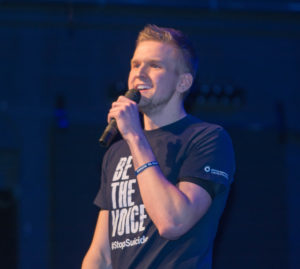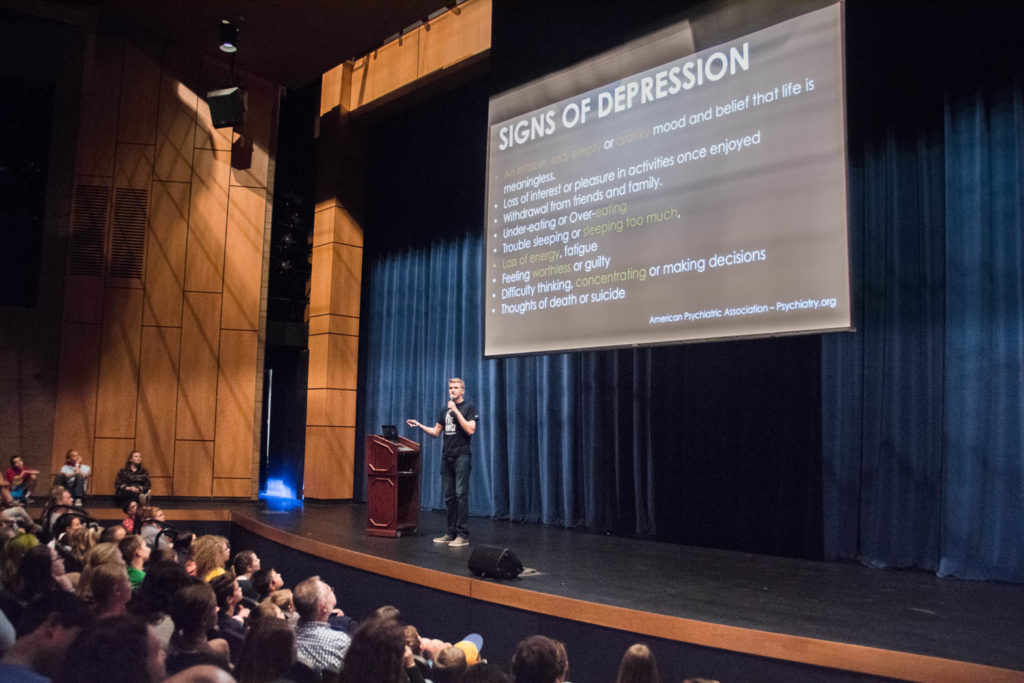Sam Eaton is a mental health advocate. In 2016, he founded Recklessly Alive, a suicide prevention organization sprinting toward a world with zero deaths by suicide. They equip and empower communities to have real discussions about mental health, depression, and suicide, through social media, educational content, and live events.
When he was just twenty-three, Sam’s life really hit rock bottom. He picked a day, wrote goodbye letters, and boxed up his belongings because he genuinely believed the world would be better without him. During the moment of the suicide attempt, he started counting backward from ten—until he reached three, and a question broke through: “Have you really given life everything you’ve got? Have you really tried to heal your past and go after what you want?”
Since that day, he has spent six weeks in Zimbabwe, jumped out of an airplane, received a master’s degree, paid off $90,000 of debt, published an Amazon best-selling book, and started his own suicide prevention organization. While he has had ongoing struggles, he continues to fight for a happy and meaningful life.
When asked why he is a mental health advocate, he shared his story of when eight years ago, three students, a teacher, and a principal in his hometown all took their own lives over a period of eighteen months. With each loss, he pondered and sat at his desk and sobbed because he personally knew the agony of wanting to die. Nobody in his community seemed to be doing anything, so he felt this push to do something. He really had no idea what he could do. He just knew something needed to be done to save lives.
Sam shared his advice on what we can do better to address mental health conditions as a society. First and foremost, we must be willing to talk about mental health and suicide—regardless of how uncomfortable it may be. Studies show that talking about suicide doesn’t make it any more likely that someone will attempt it and, in fact, makes it much more likely to seek help. A compassionate and attentive ear is one of the best gifts you can give someone struggling.
Second, we need to teach every young person about mental health and suicidal thoughts. Suicide is the
second leading cause of death in the U.S. for those aged ten to twenty-four, but eighty percent of teens don’t receive treatment for their mental health.
As a society, we must significantly increase the number of mental health providers and access to affordable mental health care. According to this article in Psychiatric Times, mental illness will cost the global economy sixteen trillion dollars annually by 2030. In December 2021, the U.S. Attorney General declared youth mental health a national crisis. We need to take massive action to connect those in need to the services that can change their lives.
Completing his first book was one of the hardest things he has ever done. He wrote three versions of the manuscript over seven years. At one point, he worked with a large publisher for a year on a new version before they decided it wouldn’t be profitable for them. Writing for thousands of hours about some of the worst stories of my life in order to recreate the emotions and events was extremely painful; however, it also proved to be healing in a way he didn’t expect.
Sam shares why kindness is important to him. Many people battling mental illness share they feel isolated. We live in a culture that keeps preaching “good vibes only” and curates polished social media profiles that don’t represent real life. We must allow those around us to have bad days and help them know that people who love them won’t dismiss the pain they feel. A thoughtful text, invitation to meet up, or willingness to listen to another’s problems can help someone decide to stay.
As someone who has struggled with his mental health, Sam says you must do one thing every day that you don’t feel like doing. When battling mental illness, your brain tries to keep you trapped—a load of laundry can feel like climbing Mount Everest.
Be kind to yourself. Allow yourself to rest when needed. Talk to someone about how you feel and seek professional help from a primary care doctor or a therapist. Take one action each day to improve your life or make the world better.
Go for a walk. Clean a closet. Text one friend. Plan an adventure. Join a new group. Do something creative. Go to the gym. Cook a healthy meal. Try group therapy. Sit in a sauna. Call a trusted family member. Take a new class. Complete one thing each day and keep that up until you feel better.
In the fall, Sam is releasing a mental health journal and planner he created during the second wave of lockdowns when he struggled again to stay alive. The journal includes areas to create bucket lists, plan self-care, and set ten-week goals, in addition to space for daily planning, self-reflection, and journaling.
We are also planning as many suicide prevention events as possible across the U.S. to tell everyone their life has value. They won’t always be in pain, and everyone can create a fully and recklessly alive life.





